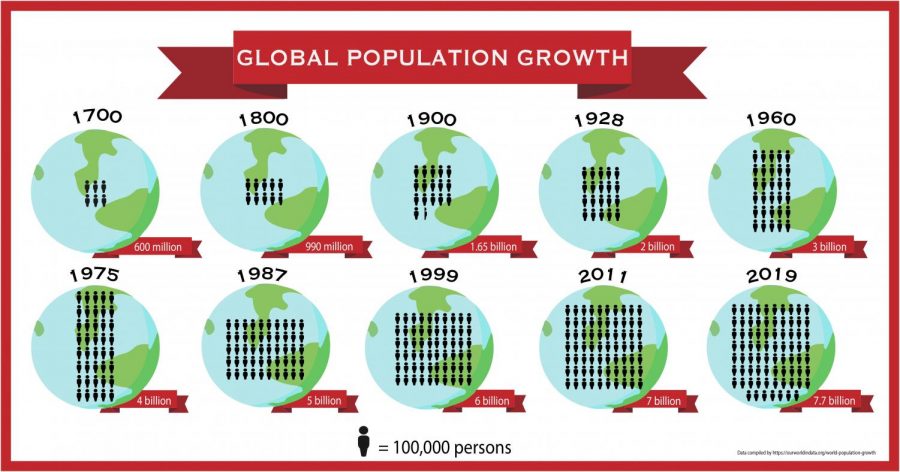Column: Overpopulation should not be a controversial topic or just a women’s issue
March 17, 2021
In the late 1960s, Paul Ehrich published “The Population Bomb,” which warned people of the detrimental effects of overpopulation, including mass starvation, political unrest and environmental deterioration. Although his predictions of famine in the 1970s and ‘80s proved wrong, they could still happen in the future. Ehrlich’s position was extreme, but I am grateful someone was talking about it because it served as a stepping stone for people to think about their own decisions. Unfortunately, his views were generally dismissed. However, the points he brought up remain as pertinent as ever, as the world’s population has doubled since the 1970s.
Overpopulation is one of the biggest threats of our generation and the generations that will follow us. It is unfair to blame it solely on certain countries that have a higher population growth rate. We need to look at the issue holistically; it is not a coincidence that in affluent countries resource distribution is more equal and the rate of growth is much lower than in countries that have high unequal resource distribution. This imbalance creates higher rates of social problems which in turn creates unequal rates of population growth. In more developed countries, the rate of population growth is less than in developing countries. To blame certain countries for a problem that affects every single continent will prove useless.
Most likely, I am a product of China’s one child rule. It was implemented in the late 1970s in the hopes that it would be a catalyst for an economic miracle. I am aware that I was very lucky to be adopted, as it allowed me to escape historic, controversial and unjust laws that caused horrible effects on entire populations — including mass sterilization and other despicable policies. I am acutely aware of the pain caused by policies implemented because of overpopulation and of the religious arguments against anti-natalist policies. By no means do I hope to invalidate many people’s hurt from policies implemented because of overpopulation, but the taboo surrounding talking about the issue needs to end, especially as much better alternatives and solutions are being brought to light.
Even though I never imagine myself having more than two kids, overpopulation has always daunted my perception of my future. Now growing up and realizing the overwhelming influence that each individual has the potential to do, my fears have subsided. Combating overpopulation needs to be played out on a local level. In small communities, it is the labor force, infrastructure and resources that are affected the most by a burgeoning population. As such, resource use and distribution of materials, basic healthcare, food and shelter should all become equally accessible. Policies that would equally distribute these resources would avoid one individual using more than they need and a tragedy-of-the-commons-type situation. For example, improving public schools, community activities in after-school programs and bigger scheme policies such as an effective income tax would fight for the underrepresented. To fight for our future, we need to put aside our own perceptions of our individual rights versus the rights of society. This argument is not meant to discourage you from having kids; instead, it should encourage you to have kids intelligently and focus on resource use as well.
I used to think that vegetarianism was the one true solution to the resource problem posed by overpopulation. Even though food-related emissions are estimated to drop by 70% by 2050, resulting in a healthier environment, this is not the one-all solution. The real answer lies in each individual taking responsibility for their own education and helping those who do not have access to it. An increase in education directly correlates to a lower number of children per woman and those who can conceive children. Good and fair access to birth control could also drastically alleviate overpopulation. Reducing the need for surprise family planning empowers women and is tied to a decrease in environmental and economic strain. In some ways, empowering women is easier than relying on every single person to use only the resources they need.
Although I wholeheartedly support women and their reproductive rights, I also agree that the entire burden is not just on women who plan to have children. It takes two to tango. Education of men’s contraceptives and birth control should be widespread. It is very easy to focus on educating women and those who conceive children, but this also makes it way too easy for men to perceive contraception as a woman’s responsibility. Both parties involved should be held responsible.
March is international women’s month. It is a global month that celebrates all achievements of women, calls to action an acceleration of women’s equality and serves as a day of recognition for women’s rights. Let’s celebrate this women’s month by working together to talk about overpopulation, and diffuse the responsibility of population not only on women.
Human population is supposed to level off around 11 billion, but the road there is going to be very complex. Again, this data should not discourage you from having children, but it should make you feel accountable for your footprint on this earth. Overpopulation should be talked about and debated more — there are simply not enough discussions about something that will affect us all in the years to come. It is up to each individual to take responsibility for their own education on the issue and educate others on the steps that will preserve our world.
Maeve Singer is a first-year computer science and environmental Science combined major. She can be reached at [email protected]


















